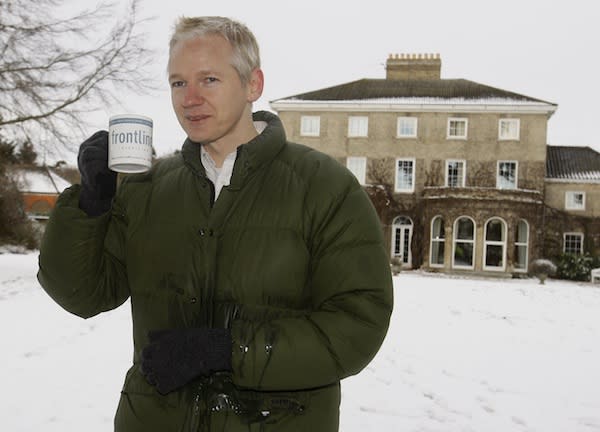 The Cutline
The CutlineWikiLeaks’ Assange isn’t talking to N.Y. Times (but still talking about Guardian)

Julian Assange hasn't kept quiet since being released on bail last week. So far, WikiLeaks' founder has given interviews to CBS, ABC, NBC, MSNBC, BBC and Al Jazeera. He also sat down with the Times of London (where he happened to voice his frustration with The Guardian).
But New York Times reporters John Burns and Ravi Somaiya didn't have much luck reaching Assange for Thursday's piece on his "high-tech house arrest" in rural England.
"Attempts by The New York Times to interview Mr. Assange in recent days were unsuccessful. For months, he has regularly changed cellphones, and had members of his close-knit entourage answer them for him.
"Recently, even those have been switched off, and Ellingham Hall has padlocked its gates against intruders. Telephones there go unanswered, and the hall's Web site for weddings and shooting parties, during which the public is charged $40 to shoot a pheasant, has been taken off-line."
It's possible that Assange just couldn't be reached before deadline. That said, Assange is also on the record harshly criticizing the Times reporters' October profile of him. And more recently, the Times wasn't included among news outlets receiving the diplomatic cables. Times reporters and editors ended up getting the documents from The Guardian.
With Assange now talking up potentially damaging bank documents -- along with reports that he has "personal files of every prisoner in Gitmo" -- surely there are plenty of news outlets that would jump in if the Times and Guardian are kept out of the mix because of their coverage of the WikiLeaks chief.
But Assange has also recently made distinctions between journalists, even within the same organization. Although Assange lashed out at The Guardian for relying on a leaked Swedish police report detailing the rape and sexual assault allegations against him, he seems particularly miffed at just one reporter.
"Some of those journalists were the allies of yours a few days ago when you were feeding them stuff -- The Guardian, for instance, the New York Times and so on," Al Jazeera's David Frost said in a Tuesday interview.
"That's not true, " Assange said. "We have a business arrangement. But the particular journalist -- you know, The Guardian's a big place, has lots of journalists. The particular journalist that they picked has a public record because of some ridiculous dispute we had about an embargo arrangement. Has publicly said that he is personally opposed to me. And in fact, refused to work on Cablegate, the biggest journalistic story of the past 10 years. He is the one that was picked to launder that information through, someone they knew would write it in a negative way."
Assange was speaking about Nick Davies, a former friend and the journalist who helped broker the original arrangement with The Guardian, New York Times and Der Spiegel before the publication of the Afghanistan war logs.
David Leigh, the investigative editor at The Guardian, defended Davies' reporting and has said that he certainly wasn't trying to tarnish Assange's reputation. In fact, Leigh told The Cutline on Tuesday that Davies actually "left out a lot of graphic and damaging material in the allegations," while publishing only what was relevant to the story.
(Photo of Assange during a news conference last week in England: AP/Kirsty Wigglesworth)
